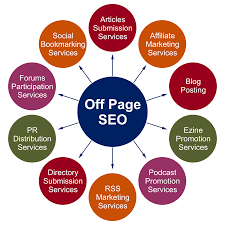Mastering SEO Reputation Management: Strategies for Online Success
The Importance of SEO Reputation Management
In today’s digital age, a company’s online reputation can make or break its success. With the prevalence of search engines as the go-to source for information, managing your online reputation through SEO has become crucial.
What is SEO Reputation Management?
SEO reputation management involves monitoring, influencing, and controlling how your brand is perceived online. It focuses on improving your online presence to ensure that positive information about your business ranks higher in search engine results than negative content.
Key Strategies for Effective SEO Reputation Management
- Monitor Your Online Presence: Regularly track mentions of your brand across various online platforms to stay informed about what is being said about your business.
- Create High-Quality Content: Develop and publish valuable, engaging content that showcases your expertise and addresses customer concerns.
- Optimise Your Website: Ensure that your website is optimised for search engines by using relevant keywords and providing a positive user experience.
- Engage with Your Audience: Respond to reviews, comments, and feedback from customers to demonstrate transparency and build trust.
- Build Quality Backlinks: Acquire links from reputable websites to boost your credibility and authority in the eyes of search engines.
- Mitigate Negative Feedback: Address negative reviews or comments promptly and professionally to show that you value customer feedback and are committed to resolving issues.
The Benefits of Effective SEO Reputation Management
By implementing robust SEO reputation management strategies, businesses can enjoy several benefits, including:
- Enhanced Brand Perception: Positive online reviews and content help shape a favourable perception of your brand among potential customers.
- Increase in Website Traffic: Improved search engine rankings lead to increased visibility and organic traffic to your website.
- Better Conversion Rates: Building trust through a positive online reputation can result in higher conversion rates and improved customer loyalty.
- Crisis Preparedness: Proactively managing your online reputation allows you to respond effectively in case of any negative publicity or crises.
In conclusion, investing in SEO reputation management is essential for businesses looking to maintain a positive brand image, attract more customers, and stay ahead of their competitors in the digital landscape.
9 Essential Tips for Effective SEO Reputation Management
- Monitor online mentions of your brand regularly.
- Respond promptly to both positive and negative feedback.
- Encourage satisfied customers to leave reviews on reputable platforms.
- Address negative feedback professionally and seek resolution.
- Optimize your website with relevant keywords for better search engine visibility.
- Create high-quality, shareable content to enhance your online reputation.
- Utilize social media channels to engage with your audience and build trust.
- Collaborate with influencers or industry experts to boost credibility.
- Stay transparent and honest in all communications regarding your brand.
Monitor online mentions of your brand regularly.
Monitoring online mentions of your brand regularly is a fundamental aspect of effective SEO reputation management. By staying vigilant and proactive in tracking how your brand is being discussed across various online platforms, you can swiftly address any negative feedback, engage with customers, and amplify positive content. This practice not only helps you maintain a positive online image but also allows you to identify opportunities for improvement, build credibility, and strengthen customer relationships. Consistent monitoring of your brand’s online presence is key to shaping a strong and resilient reputation in the digital realm.
Respond promptly to both positive and negative feedback.
In the realm of SEO reputation management, it is crucial to respond promptly to both positive and negative feedback. Acknowledging and engaging with positive feedback not only shows appreciation for satisfied customers but also helps strengthen brand loyalty. On the other hand, addressing negative feedback promptly demonstrates accountability and a commitment to resolving issues, which can mitigate potential damage to your online reputation. By actively engaging with all types of feedback, businesses can showcase their responsiveness and dedication to customer satisfaction, ultimately enhancing their overall brand perception in the digital sphere.
Encourage satisfied customers to leave reviews on reputable platforms.
To bolster your SEO reputation management efforts, it is advisable to encourage contented customers to share their positive experiences by leaving reviews on reputable platforms. By soliciting feedback from satisfied clients and guiding them towards popular review sites, you can enhance your online credibility and visibility. Positive reviews not only serve as testimonials of your excellent service but also contribute to boosting your search engine rankings, ultimately attracting more potential customers to engage with your brand.
Address negative feedback professionally and seek resolution.
When it comes to SEO reputation management, addressing negative feedback professionally and seeking resolution is paramount. By responding to criticism in a courteous and constructive manner, businesses demonstrate their commitment to customer satisfaction and show that they value feedback. Taking proactive steps to resolve issues not only helps in mitigating the impact of negative feedback but also showcases transparency and a willingness to improve. This approach can enhance brand credibility, foster trust with customers, and ultimately contribute to a positive online reputation.
Optimize your website with relevant keywords for better search engine visibility.
To enhance your online reputation and improve search engine visibility, it is crucial to optimise your website with relevant keywords. By strategically incorporating keywords that align with your brand and target audience, you can increase the chances of your website appearing higher in search engine results. This not only attracts more organic traffic but also ensures that your online presence reflects the key aspects of your business, ultimately contributing to a positive perception among potential customers.
Create high-quality, shareable content to enhance your online reputation.
Creating high-quality, shareable content is a powerful strategy in SEO reputation management. By crafting engaging and valuable content that resonates with your audience, you not only boost your online visibility but also establish credibility and trust. Shareable content has the potential to reach a wider audience, increasing brand awareness and fostering positive associations with your business. This proactive approach to content creation not only enhances your online reputation but also sets you apart as an authority in your industry, ultimately driving organic growth and customer engagement.
Utilize social media channels to engage with your audience and build trust.
Utilising social media channels is a powerful strategy in SEO reputation management. By actively engaging with your audience on platforms such as Facebook, Twitter, and Instagram, you can build trust and credibility for your brand. Responding to comments, addressing customer queries, and sharing valuable content not only enhances your online presence but also fosters a sense of transparency and connection with your target audience. Social media provides a direct line of communication that allows you to showcase your brand’s personality and values, ultimately strengthening relationships with customers and reinforcing a positive reputation online.
Collaborate with influencers or industry experts to boost credibility.
Collaborating with influencers or industry experts is a powerful strategy in SEO reputation management. By partnering with individuals who hold authority and influence in your industry, you can enhance your brand’s credibility and reach a wider audience. When reputable figures endorse your business or share positive experiences, it not only boosts your online reputation but also establishes trust with potential customers. Leveraging the expertise and following of influencers can significantly impact how your brand is perceived online, ultimately contributing to a stronger and more positive digital presence.
Stay transparent and honest in all communications regarding your brand.
To effectively manage your SEO reputation, it is crucial to maintain transparency and honesty in all communications related to your brand. By being open and truthful with your audience, you build trust and credibility, which are essential for a positive online reputation. Whether responding to reviews, addressing customer feedback, or sharing information about your products or services, honesty should always be at the forefront of your communication strategy. Transparency not only fosters a strong relationship with your audience but also showcases your commitment to integrity and authenticity in the digital realm.

